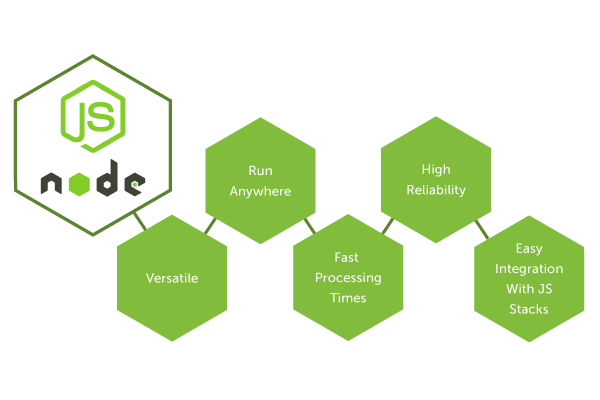Best and Cheap Node.js v20.0.0 Cloud Hosting Provider Great Discount 15% OFF

Best and Cheap Node.js v20.0.0 Cloud Hosting Provider Great Discount 15% OFF
What is Node.js?
Node is one of the most popular JavaScript frameworks which decisively eases the work of anyone building web applications. It is by far the fastest growing language in use, it runs on Windows, Linux, Mac OS and it ranks in Top-10 most wanted developer skills. The use of Node.js is mainly for full stack, front-end and back-end.
Node JS is a open-source JavaScript runtime environment, i.e. the infrastructure to build and run software applications in JavaScript. It allows developers to execute the code on the server side. Meaning: on own computer or straight in a browser. Therefore, Node.js is light, scalable and fast way to write scripts.

It is known to be very comfortable to use having the following advantages:
· it is light, scalable and fast way to write script allowing the developers to carry out the code on the server side, i.e.: on own computer or straight in a browser;
· it allows and unifies app development, removing the need for different languages;
· node.js is uses to create web applications in real-time;
· provides possibility for mobile app development;
· allows using the code or scripts that have been written in other languages.
Node.js has a terrific helper tool – Garbage Collector. It manages application’s memory and prevents memory leaks. Thus, main gains of Node.js apps are:
- speed (runs on google JS engine)
- non-blocking I/O paradigm
- data streaming (HTTP requests and responses as a single event)
- real-time apps (client-side and server-side)
- unified database queries (JSON format)
- easy and fast coding
- open-source NPM repository (over 60.000 modules)
- proxy server ability
- fast development cycles
- business logic on the server
- appropriate for android devices
How does Node.js work:
- a task goes to the file system
- the system is ready for next requests
- when a file is opened and read, the system sends the content to the client
In other words, with Node you do not have to wait and can go on with next tasks. This is one of the reasons it is so efficient. Now, what is a Node.js file:
- it contains tasks and executes them upon set events
- an event is when someone tries to access the server
- a file should be initiated on the server
- files have ‘.js’ extension
10 main reasons to use Node.js
- Good for beginner developers, JavaScript is simple to learn, rich framework (Angular, Node, Backbone, Ember)
- It is fast, due to Google innovative technologies and the event loop
- Ability to keep data in native JSON (object notation) format in your database
- Multiple modules (NPM, Grunt, etc.) and supportive community
- Good to create real-time apps, such as chats and games
- Single free codebase
- Good for data streaming, thus for audio and video files, as example
- Sponsored by Linux Foundation, as well as PayPal, Joylent, Microsoft, Walmart
- Wide range of hosting options
- JS is the longest running language, 99% of developers know some of it
Now, here are best Node.js projects examples:
· PayPal and Node.js
· Netflix and Node.js
· Uber and Node.js
· LinkedIn and Node.js
· Ebay and Node.js
· Fusion Marketing and Node.js, etc.
As with Node.js one can use JavaScript on the server, this means one can write JS outside the browser. Additionally, Node.js has the same strength as JavaScript. And it is based on events. These are the 3 whales Node firmly stands on. Thus the use of this framework can be describes as follows:
- streaming data – e.g., file uploading in real time, file encoding while uploading, building proxies between data layers.
- single page apps –modern web applications, heavy on processing on the client side. Positive response times and sharing data between the server and the client make a good fit for such apps.
- web applications – classic web apps on the server side, using Node JS to carry HTML. One of the main benefits in this regard is more SEO-friendly content.
- chats / RTAs – lightweight real-time applications, like messaging apps interfaces, Twitter, chat software. A classic chat would be a great example of Node use. Simple, intensive on data and across multiple devices.
- APIs – REST / JSON programming interfaces and exposing databases or web services through it. No worries about conversion between systems.
- proxy – to deploy Node as proxy to handle connections in non-blocking way. Great for app working with external services, exporting and importing lots of data.
- Dashboards – web application or system monitoring dashboards, enabling tracking user actions. Node also can visualize such interactions for you in real-time.
Notable Changes
Permission Model
Node.js now has an experimental feature called the Permission Model. It allows developers to restrict access to specific resources during program execution, such as file system operations, child process spawning, and worker thread creation. The API exists behind a flag --experimental-permission which when enabled will restrict access to all available permissions. By using this feature, developers can prevent their applications from accessing or modifying sensitive data or running potentially harmful code. More information about the Permission Model can be found in the Node.js documentation.
The Permission Model was a contribution by Rafael Gonzaga in #44004.
Custom ESM loader hooks run on dedicated thread
ESM hooks supplied via loaders (--experimental-loader=foo.mjs) now run in a dedicated thread, isolated from the main thread. This provides a separate scope for loaders and ensures no cross-contamination between loaders and application code.
Synchronous import.meta.resolve()
In alignment with browser behavior, this function now returns synchronously. Despite this, user loader resolve hooks can still be defined as async functions (or as sync functions, if the author prefers). Even when there are async resolve hooks loaded, import.meta.resolve will still return synchronously for application code.
Contributed by Anna Henningsen, Antoine du Hamel, Geoffrey Booth, Guy Bedford, Jacob Smith, and Michaël Zasso in #44710
V8 11.3
The V8 engine is updated to version 11.3, which is part of Chromium 113. This version includes three new features to the JavaScript API:
- String.prototype.isWellFormed and toWellFormed
- Methods that change Array and TypedArray by copy
- Resizable ArrayBuffer and growable SharedArrayBuffer
- RegExp v flag with set notation + properties of strings
- WebAssembly Tail Call
The V8 update was a contribution by Michaël Zasso in #47251.
Stable Test Runner
The recent update to Node.js, version 20, includes an important change to the test_runner module. The module has been marked as stable after a recent update. Previously, the test_runner module was experimental, but this change marks it as a stable module that is ready for production use.
Contributed by Colin Ihrig in #46983
Ada 2.0
Node.js v20 comes with the latest version of the URL parser, Ada. This update brings significant performance improvements to URL parsing, including enhancements to the url.domainToASCII and url.domainToUnicode functions in node:url.
Ada 2.0 has been integrated into the Node.js codebase, ensuring that all parts of the application can benefit from the improved performance. Additionally, Ada 2.0 features a significant performance boost over its predecessor, Ada 1.0.4, while also eliminating the need for the ICU requirement for URL hostname parsing.
Contributed by Yagiz Nizipli and Daniel Lemire in #47339
Preparing single executable apps now requires injecting a Blob
Building a single executable app now requires injecting a blob prepared by Node.js from a JSON config instead of injecting the raw JS file. This opens up the possibility of embedding multiple co-existing resources into the SEA (Single Executable Apps).
Contributed by Joyee Cheung in #47125
Web Crypto API
Web Crypto API functions’ arguments are now coerced and validated as per their WebIDL definitions like in other Web Crypto API implementations. This further improves interoperability with other implementations of Web Crypto API.
This change was made by Filip Skokan in #46067.
Official support for ARM64 Windows
Node.js now includes binaries for ARM64 Windows, allowing for native execution on the platform. The MSI, zip/7z packages, and executable are available from the Node.js download site along with all other platforms. The CI system was updated and all changes are now fully tested on ARM64 Windows, to prevent regressions and ensure compatibility.
ARM64 Windows was upgraded to tier 2 support by Stefan Stojanovic in #47233.
WASI version must now be specified
When new WASI() is called, the version option is now required and has no default value. Any code that relied on the default for the version will need to be updated to request a specific version.
This change was made by Michael Dawson in #47391.
Deprecations and Removals
- [
3bed5f11e0] – (SEMVER-MAJOR) url: runtime-deprecate url.parse() with invalid ports (Rich Trott) #45526
url.parse() accepts URLs with ports that are not numbers. This behavior might result in host name spoofing with unexpected input. These URLs will throw an error in future versions of Node.js, as the WHATWG URL API does already. Starting with Node.js 20, these URLS cause url.parse() to emit a warning.
How to Choose Best and Cheap Node.js v20.0.0 Cloud Hosting Provider?
To choose hosting provider that fully support Node.js v20.0.0 is not easy task. We highly recommend ASPHostPortal for your Node.js v20.0.0 hosting partner. Not only offer cheap price, but also expert Node.js v20.0.0 support team. You feel free to host your great Node.js v20.0.0 site with their great Node.js v20.0.0 hosting service. The following are the reasons why you should choose ASPHostPortal as your Node.js v20.0.0 hosting partner.
Why ASPHostPortal is the Best and Cheap Node.js v20.0.0 Cloud Hosting Provider?
ASPHostPortal.com – Offers Best Price
ASPHostPortal comes with eight Windows cloud hosting plan, and the prices start from $3.00/mo, normally. With the exclusive promotional link, customers can get the hosting at only $2.00/mo, 33.3% off the regular prices. And you can start your Node.js v20.0.0 site from $4.00/mo only. That certainly makes ASPHostPortal the cheapest Node.js v20.0.0 cloud hosting in the field. Moreover, if there is anything wrong, customers can cancel the service, and ask their full money back within the first 30 days, according to ASPHostPortal 30 Days Money Back Guarantee.

ASPHostPortal.com – Plesk Control Panel
ASPHostPortal Windows Hosting comes with Plesk control panel. Plesk is best control panel to manage windows hosting. You can easily manage your server, email accounts with few clicks. You can instantly install over 100 applications on your website with just a few clicks. You can check everything about your website including disk space, traffic, logs & statistics and many more.
ASPHostPortal.com – 99.99% Uptime Guarantee
Does ASPHostPortal really give 99.99% up time? The answer is yes. ASPHostPortal Hosting servers are capable enough to make your website 99.99% available. ASPHostPortal has established a world-class infrastructure making it possible to guarantee such a high uptime percentage. Of course there is always the possibility that some factor beyond the control of the ASPHostPortal Company will result in more downtime. Fortunately, this does not occur too often. Upgrades and maintenance downtime are acceptable and do not impact the uptime guarantee.
ASPHostPortal.com – Expert Support Team
In order to provide top-level web hosting service, ASPHostPortal.com offers 24/7 available technical support with professional and experienced support staffs via create ticket from helpdesk. Besides, those support staffs are been in this field for over 3 years, thus be able to offer efficient troubleshooting process, and provide the best resolutions to any issues raised by customers.